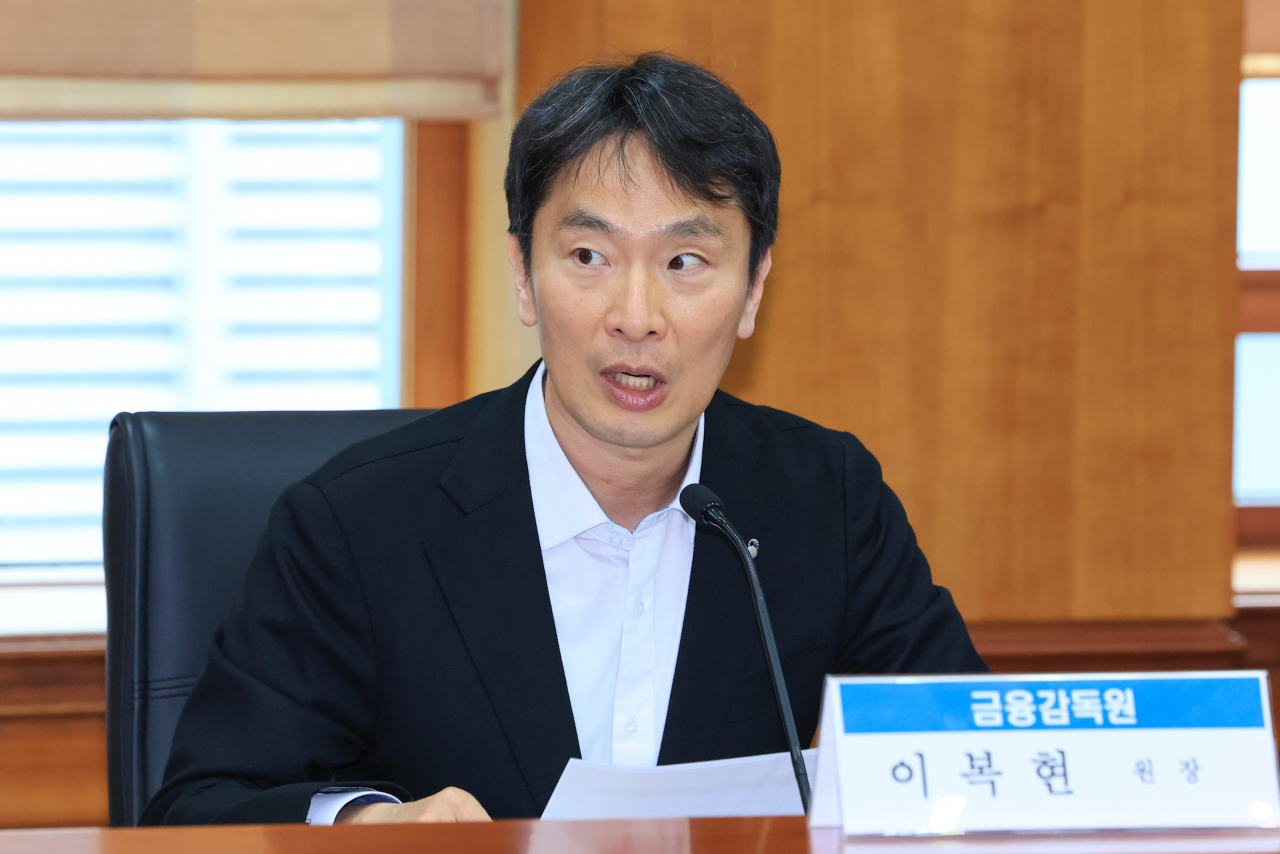Financial regulator to complete short selling probe this year
By Choi Ji-wonPublished : May 9, 2024 - 18:45

South Korea's chief financial regulator, Financial Supervisory Service Governor Lee Bok-hyun, said the agency plans to conclude its ongoing investigation into illegal short selling by the end of the year. He made the statement during a meeting with a group of reporters on Thursday.
"We've completed investigations into some companies and made significant progress with three others. About five companies remain, and, if possible, our goal is to wrap up the investigation by the end of this year," Lee stated.
The FSS revealed on Monday that seven additional global banks were found to have engaged in illegal short selling, totaling approximately 155.6 billion won ($113.5 million) in the South Korean market. This adds to the 55.6 billion won linked to BNP Paribas and HSBC announced in November, bringing the total to 211.2 billion won across nine banks.
During the Thursday meeting, Lee highlighted that the investigation uncovered "significant management issues" that contradict the companies' claims of robust internal compliance systems.
The question of whether these suspected illegal short selling practices were intentional varies by case, Lee added. "They might not have noticed initially, but if they continued placing short-selling orders without checking their balance, they would have realized their compliance measures had failed. At some point, they must have been aware, leading us to conclude there was at least some degree of intent."
Naked short selling, which is illegal in South Korea, involves short selling without securing the shares in advance.
Lee acknowledged that regulatory discrepancies between countries, as well as gaps in local regulations, might have contributed to the prevalence of naked short selling. The FSS is developing a computerized system to centrally monitor short selling, expected to be operational early next year.
To strengthen ties with investors, an FSS delegation led by Vice Chair Ham Yong-il will visit Hong Kong next Wednesday to meet with global banks and regulators. The delegation will hold meetings with those responsible for Korean investments to introduce local rules and collect feedback for improvement.
Lee noted that no definitive decisions have been made regarding the temporary ban on short selling, which is due for review in July. However, given the recent cases of illegal short selling, industry insiders expect that the ban is likely to be extended.
In the context of misselling equity-linked securities, Lee commented negatively about the complete ban on high-risk derivative products, pointing out that the issue wasn't with the product itself, but with how it was marketed.
"The problem with ELS was that the (sales) system was poorly designed, placing all downside risk on customers," he noted, denouncing the sellers that deliberately recommended the products to financially uneducated retail investors.
Around 11 local banks and brokerages were caught misselling ELS products tracking the slumping Hang Seng China Enterprises Index and are set to compensate trillions of won to local retail investors. Next week, the agency is slated to convene a dispute resolution committee next week to address representative cases and establish a framework for compensation.
Lee reiterated the need to delay the implementation of the financial investment income tax, which is set to take effect in 2025.
Under this forthcoming regulation, capital gains exceeding 50 million won from stock investments will incur a 20 percent tax, while gains over 300 million won will face a 25 percent tax.
Lee stressed that more discussion is needed to ensure the law accounts for the significant changes in the local investment landscape. "What we can say for the least right now is that the current approach will not work. A lot of capital could leave the market. We could see a domino effect of negative consequences."
While he declined to provide specifics on measures to address the real estate project financing crisis, he assured that the situation is "under control." He stated that, although there are public concerns about a possible workout crisis among major construction companies, the visible risk factors are being managed.
Addressing speculations about his potential move later this year, Lee indicated that he might leave his position before his official tenure ends in June next year. However, he stated his desire to resolve ongoing issues, particularly the real estate project financing crisis, before his departure.
"I think we'll get a sense of how the macroeconomic cycle will evolve by July or August. During the latter half of the year, we should have a clearer picture of how the normalization of the PF situation could develop," he said, adding, "After that, someone else may be able to take over the job."



















![[Today’s K-pop] Treasure to publish magazine for debut anniversary](http://res.heraldm.com/phpwas/restmb_idxmake.php?idx=642&simg=/content/image/2024/07/26/20240726050551_0.jpg&u=)